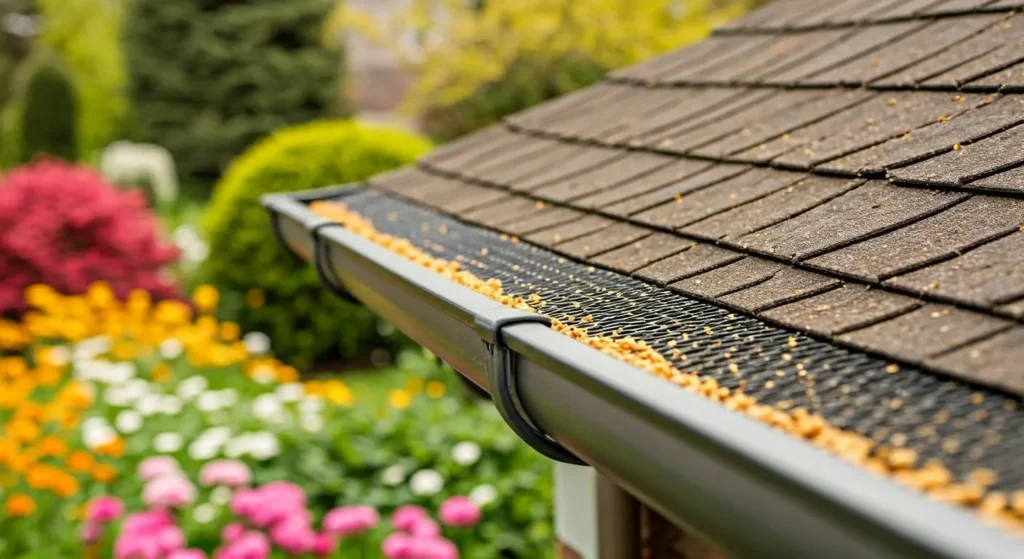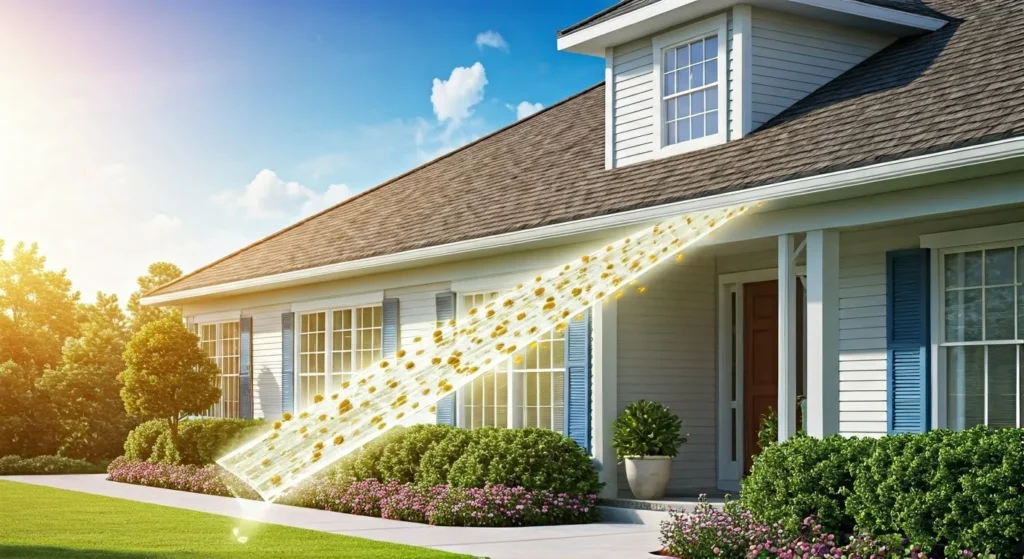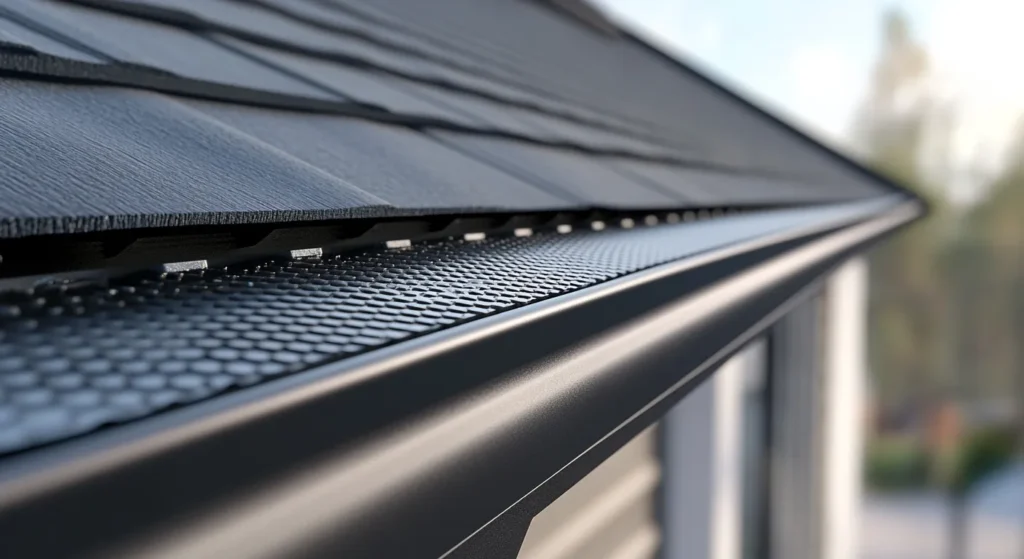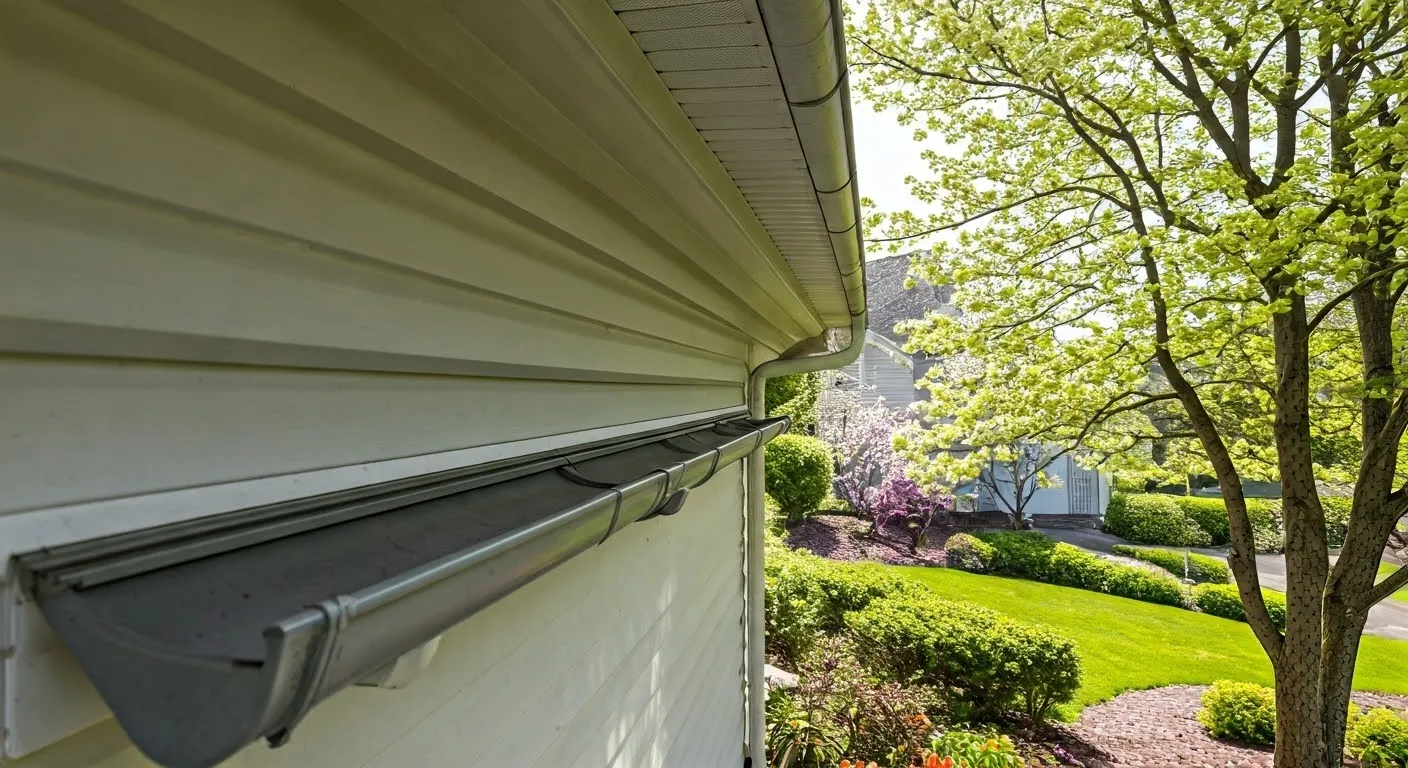This blog from MY Pittsburgh Gutters discusses how gutter guards play a crucial role in protecting your home from pollen. As homeowners, we all want to protect our havens from potential harm. Heavy rain, while essential, can also lead to water damage, especially if our gutters are clogged. One often-overlooked culprit? Pollen. This seemingly harmless substance can wreak havoc on your gutter system, leading to blockages and potential water damage. This is where gutter guards come in, providing a protective barrier against pollen and other debris.
Understanding Pollen and Its Impact on Your Home
Pollen, a fine powdery substance released by plants during their reproductive cycle, is notorious for triggering allergies in many individuals. However, its impact extends beyond our respiratory systems. When pollen accumulates in your gutters, it can mix with other debris like leaves and twigs, creating a stubborn buildup that obstructs water flow. This buildup not only reduces your gutters’ efficiency but also creates a breeding ground for mold, mildew, and pests—all of which can negatively impact your home and health.
For homeowners, this means understanding the importance of managing pollen, especially during peak seasons, to prevent potential issues and maintain a healthy living environment.
The Science of Pollen Spread and Accumulation
Pollen grains, due to their small size and often sticky nature, are easily carried by the wind. During spring, when a lot of spring pollen is released, these microscopic particles can travel considerable distances, inevitably landing on our roofs and into our gutters. Once settled, pollen acts like a glue, trapping other types of debris such as leaves, twigs, and dirt, forming a thick, clogging mass. This sticky buildup not only hinders water flow but also creates a hospitable environment for mold growth and pest infestations.
The accumulation of this organic matter creates a perfect storm for gutter issues. Understanding this natural process highlights the importance of a proactive approach, such as installing gutter guards, to mitigate the risks associated with pollen buildup.
How Pollen Affects Your Home’s Exterior and Air Quality
As pollen accumulates in your gutters, it poses several risks to your home and health. Firstly, clogged gutters can lead to water overflow, potentially damaging your roof, siding, and foundation. This overflow can also seep into your home’s interior, leading to mold growth and compromising the structural integrity of your house. Additionally, stagnant water in clogged gutters becomes a breeding ground for mosquitoes and other pests, posing health risks.
Furthermore, pollen buildup can negatively impact your home’s air quality. As pollen breaks down, it releases spores and other allergens into the air. These allergens can easily enter your home through windows, doors, and ventilation systems, potentially triggering allergies and respiratory problems for you and your family.
The Role of Gutter Guards in Pollen Defense

Gutter guards provide an effective solution to combat pollen-related gutter issues. They act as a shield, preventing pollen and other debris from entering your gutters in the first place. This proactive approach helps maintain the functionality of your gutter system, ensuring proper water flow and preventing potential damage to your home.
By acting as a barrier, gutter guards significantly reduce the accumulation of organic matter in your gutters, minimizing the risks associated with pollen buildup.
Types of Gutter Guards and Their Effectiveness Against Pollen
Protecting your home from pollen starts with choosing the right gutter guard. Several types of gutter guards are available in the market, each with its pros and cons:
- Mesh Gutter Guards: Considered one of the most effective types, mesh gutter guards feature a fine, breathable screen that allows water to pass through while effectively blocking pollen and other small debris.
- Reverse Curve Gutter Guards: These guards utilize a curved design that directs water into the gutter while deflecting debris. However, they might not be as effective against smaller particles like pollen.
- Foam Gutter Guards: While budget-friendly, foam gutter guards tend to absorb water, becoming heavy and less effective over time, especially in areas with high pollen counts.
For optimal pollen control, mesh gutter guards prove to be a reliable choice due to their fine filtration capabilities.
Contact UsThe Mechanism: How Gutter Guards Keep Pollen Out
Gutter guards function as a physical barrier, effectively preventing pollen and other debris from entering your gutter system. Depending on the type of gutter guard, the mechanism of action might differ. For instance, mesh gutter guards employ a fine screen with very small holes, allowing water flow while blocking even small debris like pollen.
On the other hand, surface tension designs, like reverse curve gutter guards, rely on the principles of water adhesion and gravity. The curved surface guides water into the gutter, while debris, including pollen, falls off the edge due to its inability to cling to the curved surface.
The choice of a specific type of gutter guard for pollen control depends on various factors, including the severity of pollen in your area, budget, and aesthetic preferences.
Benefits of Installing Gutter Guards for Pollen Control

Installing gutter guards for pollen control provides numerous benefits. It reduces the frequency of gutter cleaning, saving you valuable time and effort. By preventing pollen buildup, gutter guards help maintain a healthier home environment by minimizing allergens and reducing the risk of pest infestations.
Moreover, gutter guards protect your home from potential water damage caused by clogged gutters, contributing to the longevity and value of your property.
Reduced Allergens Around Your Home Environment
One of the most significant benefits of installing gutter guards is the resulting reduction of allergens around your home. As gutter guards block pollen from accumulating and decomposing in your gutters, they help maintain cleaner air around your home’s perimeter. This is particularly beneficial for allergy sufferers who are sensitive to pollen.
Clean gutters translate to fewer allergens being released into the air near your home. This can lead to a significant improvement in allergy symptoms for those who are susceptible. Imagine enjoying your outdoor space without the constant worry of allergy flare-ups.
Less Maintenance and Cleaning of Gutters
Gutter cleaning is a tedious and often dangerous task. Thankfully, gutter guards drastically reduce the need for frequent cleanings. By preventing leaves, twigs, and especially pollen from settling inside your gutters, they save you from climbing ladders and scooping out gunk.
However, it’s important to note that no system is completely maintenance-free. Even with gutter guards, occasional cleaning is recommended to remove any debris that might accumulate on top of the guards, ensuring optimal performance. Some helpful gutter cleaning tips include using a blower or a hose to clear off loose debris and inspecting your gutters periodically, especially after heavy storms.

Installation and Maintenance of Gutter Guards
When it comes to gutter guards, proper installation is key. While some homeowners opt for the DIY route, professional installation is highly recommended to ensure a secure and effective fit. Professionals have the experience and expertise to assess your roof type, gutter system, and local climate to recommend the best gutter guard solution for your specific needs.
Once installed, maintaining your gutter guards is relatively simple. Regular visual inspections, ideally twice a year, can help identify any debris buildup or potential issues.
Call Us (412) 657-8460Tips for Maintaining Gutter Guards for Optimal Performance
Maintaining your gutter guards is crucial for their longevity and effectiveness in protecting your home from pollen and other debris. While gutter guards significantly reduce the need for cleaning, implementing these maintenance tips ensures optimal performance:
- Regular Inspections: Conduct visual inspections of your gutter guards at least twice a year, preferably in spring and fall, to check for any debris buildup, sagging, or damage.
- Remove Debris: Clear off any leaves, twigs, or pollen that might have accumulated on top of the guards using a soft-bristled brush, a blower, or a gentle stream of water from a garden hose.
- Check for Damage: Look for any signs of damage to the gutter guards, such as dents, cracks, or loose sections. Address any repairs promptly to prevent potential leaks or reduced effectiveness.
- Consider Professional Maintenance: For a thorough inspection and cleaning, especially after heavy rainfall or storms, consider hiring a professional gutter cleaning service every few years.
Conclusion
In conclusion, gutter guards play a vital role in shielding your home from the impact of pollen. By preventing pollen accumulation in gutters, they help maintain a cleaner and healthier environment both inside and outside your home. Choosing the right gutter guard can significantly reduce allergens and the need for frequent gutter maintenance. Optimal installation and maintenance of gutter guards ensure effective pollen control and improve your home’s overall air quality. So, if you’re looking to enhance your home’s protection against pollen, installing quality gutter guards is a smart investment.

Frequently Asked Questions
Can gutter guards completely eliminate the need for gutter cleaning?
While gutter guards drastically reduce the need for frequent cleaning, they might not completely eliminate it. Occasional maintenance is still recommended to remove any debris that accumulates on the guards, preventing potential blockages and ensuring optimal performance.
How often should gutter guards be replaced or maintained?
The lifespan of gutter guards varies depending on the type and material. However, with proper maintenance, they can last for many years. It’s recommended to have them inspected annually and replaced if you notice any signs of damage or wear and tear. Professional installation can also extend their lifespan.
Are there specific types of gutter guards that are best for pollen control?
Mesh gutter guards, with their fine screens, are often considered the most effective for pollen control. They provide a barrier that blocks pollen while allowing water to flow freely through the gutters, preventing clogs and buildup.
Can installing gutter guards improve my home’s air quality?
Yes, installing gutter guards can indirectly improve your home’s air quality. By preventing pollen and debris buildup in gutters, they reduce the number of allergens around your home. This is particularly beneficial for people with allergies, potentially alleviating their symptoms.


